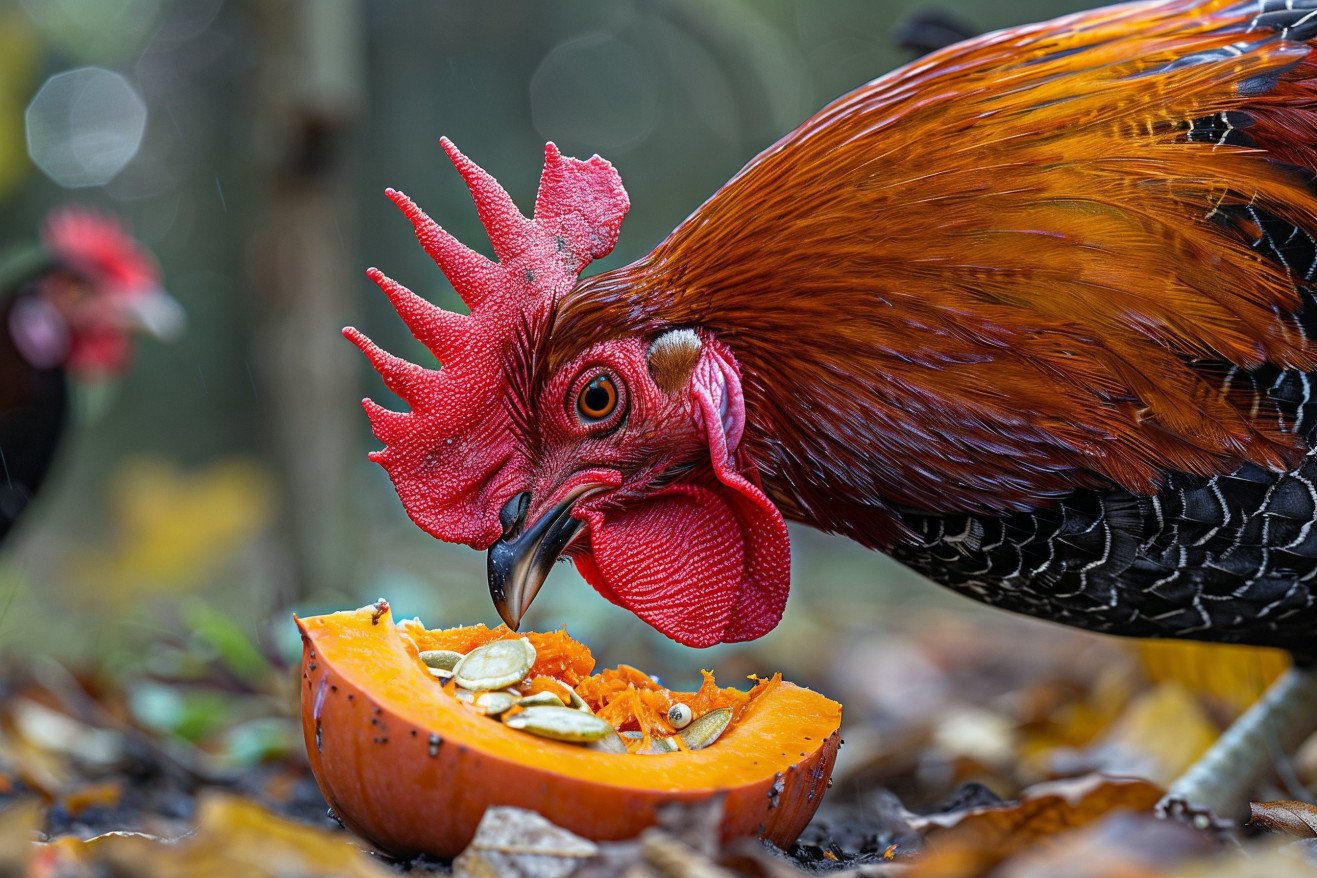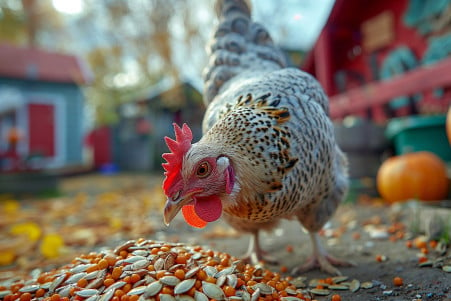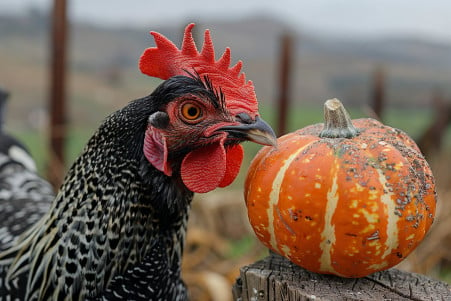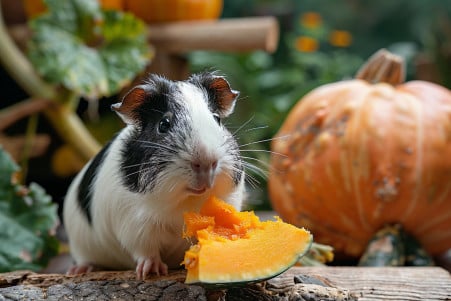Can Chickens Eat Pumpkin? A Guide to This Nutritious Treat
10 May 2024 • Updated 9 May 2024

Chickens can eat pumpkin and it can be a great way to supplement their diet, but there are some things to consider before you start feeding this nutritious fall staple to your backyard chickens. Pumpkins are a great source of vitamins A and C, antioxidants, fiber, and water for chickens, and their seeds are a great source of protein. However, because of the high water and sugar content, it’s important to feed pumpkins to chickens in moderation to avoid digestive upset.
By reviewing information from agricultural extension offices, veterinarians, and other chicken experts, we’ll cover the benefits of feeding pumpkins to chickens, how much pumpkin is safe to feed them, and the best ways to prepare and feed this seasonal treat. You’ll also find out how to feed pumpkins to your chickens in a way that will improve their diet without affecting their egg production or causing other issues.
Can chickens eat pumpkin?
Nutritional Benefits of Feeding Pumpkin to Chickens
Pumpkin isn’t just a fun fall food - it’s also a nutritional goldmine for your backyard chickens. According to The Spruce Pets, pumpkins provide vitamins A, B, and C, as well as minerals like potassium and zinc.
Vitamin A is important for chickens’ immune systems and overall health, and the potassium in pumpkins is especially important for chicks as it helps with their development and helps chickens deal with heat stress, says Mother Earth News.
But that’s not all. The seeds are also an antioxidant that can help fight parasites, E. coli, and coccidiosis, and it can even work as a natural dewormer, according to CoopCrate. In addition, the fiber in pumpkins can help with digestion.
Given all of these benefits, adding pumpkin to your chickens’ diet can be an easy way to improve their health. Just make sure you’re feeding them the right amount, which we’ll discuss in the next section.
What Are the Safe Portions and Parts of Pumpkin for Chickens?
All parts of the pumpkin, including the flesh, skin, and seeds, are safe for chickens to eat, according to BackYard Chickens. However, pumpkin should only make up 10-15% of a chicken's diet to prevent digestive upset, such as diarrhea. CoopCrate even says that giving an entire pumpkin to a flock every day would be too much.
While whole raw pumpkin seeds are safe for chickens to eat, ground or otherwise processed seeds are not recommended, as they can lead to digestive upset, according to BackYard Chickens. It's important to make sure that you're not overfeeding your chickens pumpkin, and that you're not giving them too many seeds, to ensure that they're getting a well-balanced diet.
How to Prepare and Feed Pumpkins to Your Chickens
Pumpkins can be fed to chickens in a variety of ways, including raw, cooked, fresh, and frozen. According to Raising Happy Chickens, leftover pumpkin puree from cooking can also be given to chickens as a special treat. When feeding whole pumpkins, it's best to cut them in half or into smaller pieces so that they are easier for your chickens to eat.
BackYard Chickens explains that pumpkins can be stored for up to 3 months in a cool, dark place, so you can buy them in bulk and feed them to your chickens throughout the fall and winter. However, it's important to keep in mind that pumpkin should only be used as a supplement and not a replacement for a well-rounded commercial chicken feed, as per Fresh Eggs Daily.
Can You Feed Chickens Pumpkin Leaves, Stems, and Rinds?
Chickens can eat pumpkin leaves and vines, which are not toxic according to BackYard Chickens. However, it's best to steer clear of canned pumpkin pie filling, which may have added sugars and preservatives that aren't good for chickens.
Wandering Hoof Ranch warns against feeding chickens moldy, decorated, or painted pumpkins because of potential toxins. However, chickens can eat carved jack-o'-lanterns as long as they aren't moldy or spoiled. To extend the life of pumpkins for chicken consumption, Kalmbach Feeds suggests wiping them down with vinegar.
With these guidelines in mind, you can feel confident feeding your chickens a variety of pumpkin parts to ensure they get the nutritional benefits without any of the downsides.
Pumpkin-Based Human Foods and Potential Concerns
While chickens can eat pumpkin, not all pumpkin-based human foods are safe for backyard flocks. According to Purina Animal Nutrition, pumpkin is a healthy and nutritious option, but the article doesn’t specifically mention pumpkin pie or other pumpkin-based baked goods.
Fresh Eggs Daily says that a "bit of leftover pumpkin pie actually has some nutritional value", and the same is true for apple pie, but both should be given as an occasional treat, not a regular part of a chicken's diet. However, Garden Farm Thrive warns against feeding chickens canned pumpkin or pumpkin pie filling, as they often contain added sugars and preservatives that can be toxic.
Pumpkin-based baked goods may also contain other ingredients like butter or spices that are not safe for chickens. To ensure that you’re providing your chickens with the most nutritional value, it’s best to stick to feeding them fresh, raw pumpkin instead of processed human foods. By keeping these points in mind, you can feel confident about feeding your chickens pumpkin as a healthy, seasonal treat.
Conclusion: How to Add Pumpkin to a Healthy Chicken Diet
Pumpkin can be a healthy and fun addition to your chickens' diet if it's fed in moderation. As Raising Happy Chickens explains, for the best results, you should feed pumpkin as a supplement to a balanced commercial chicken feed. To make sure your chickens get the most out of the pumpkin, make sure they eat all parts of it, including the flesh, seeds, and skin.
To make sure the pumpkin is safe for your chickens to eat, it's important to prepare and store it properly. According to The Spruce Pets, you should cut whole pumpkins into smaller pieces and avoid canned pumpkin that contains sugar or preservatives.
Adding pumpkin to your chickens' diet can help them in a number of ways and add to their overall nutrition. By feeding them this seasonal treat in moderation, you can help ensure your chickens' health and give them a tasty and nutritious snack.


